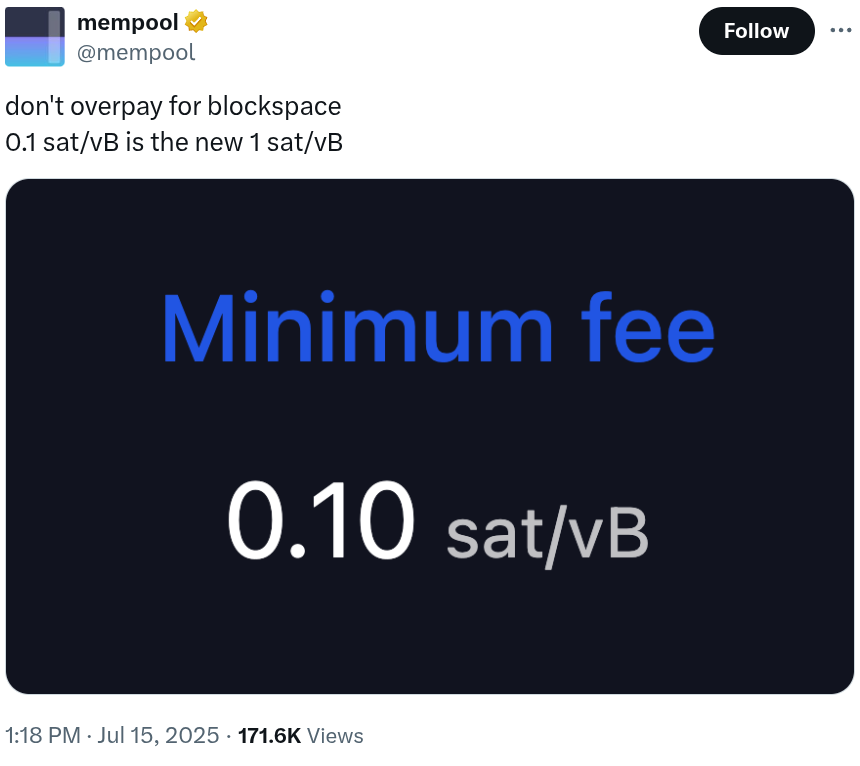
The core software of Bitcoin has recently adjusted its default minimum relay fee for transactions, representing one of the most impactful modifications in recent years regarding the cost of transferring funds within the network.
On September 4, Bitcoin Core version 29.1 was launched, establishing a new default minimum relay fee rate at 100 satoshis per thousand virtual bytes (0.1 sats/vB), which is a dramatic reduction of 90% from the previous standard rate of 1 sat/vB. Users are charged fees based on their transaction size multiplied by this unit (satoshis), which is the smallest denomination of Bitcoin.
Although individual node operators have the ability to modify this setting, it is anticipated that most will retain the default configuration. Nodes typically do not process or acknowledge transactions with fees that fall below their set minimum relay fee threshold.
This adjustment was decided upon by developers on August 15 and was influenced by fluctuations in Bitcoin’s exchange rates over approximately ten years. The proposal indicated that while maintaining a minimum fee serves as protection against denial-of-service (DoS) attacks, current market conditions allow for lower fees to be deemed acceptable in BTC terms.
Gradual Adoption Anticipated
Data from BitRef indicates that more than 72.5% of all Bitcoin nodes (18,811) operate using Bitcoin Core software; nearly 27.25% utilize Bitcoin Knots—a variant focused on enhancing user control over settings. A closer examination reveals that among these nodes, Bitcoin Core version 29 stands out as the most widely used with about 4,510 instances accounting for over 18% of total network usage.
Related:Concerns about censorship prompt Ordinals developer to consider forking from Bitcoin Core
This is followed closely by approximately 3,991 nodes running version 28.1 (nearly16%) and around3,083 instances operating on Knots version29.1(12.31%). Only about571 nodes are currently utilizingBitcoinCore29 .1 ,making up less than2 .3 %of thenetwork .
WhileBitcoinKnots29 .1isbasedonBitcoinCore29 .1 ,itdoesnotadoptitsnewdefaults.Instead ,thisupdateallowsKnotsusers tomake “mostpolicyoptionsconfigurableinGUIOptions,” alongwithaddingthe‘corepolicy’optiontoadoptdefaultsettingsfromBitcoinCore.

The adjustment made by Bitcoin Knots raises its default minimum relay fee tenfold to preserve previous values.Source:GitHub
It’s likelythatamajorityofthe571nodesrunningonBitcoinCore29 .1andanundeterminedportionofthenodesoperatingonKnotsversion29 .1areutilizingthenewlyloweredminimumrelayfeepolicy.
Related: AsBitcoinKnotsgainmomentum,couldachainsplitimpactBTCvalues?
The Community’s Response to Reduced Fees
Gloria Zhao,a developerassociatedwithBitcoinCore ,statedthatthischangewasalsoinspiredbyarecenttrendwheretransactionsbelowthepreviousfee limitwerebeingminedregardless.Thisoccurredbecausealthoughtherewasapredefineddefaultvalue,nodeoperatorscouldstillsettheirpreferredrates.
This ledtoissues,since“blockscontainingnumeroussub-onesat/vBtransactionsdon’tpropagateasquicklytonodesthatrejectedorwereuninformedaboutthoseearliertransactions.”However,Zhao emphasizedtheneedtoprotectthenetworkagainstspamandDoSattackswhileensuringthatdefaultratesarenotsettoo low but rather adjustedjustenoughtoavoidblockrelayproblems.
Mempool.Space,a serviceprovidingdataontheBitcoinnetwork,supportedthecallforlowerfees,recommendinguserstoavoidoverpayingfortheblockchainspace theyoccupy.“0 .1sat/vBisnowtheequivalentofwhatusedtobeone sat/vB,”theywroteinamidsummerXpost.

Source:Mempool
Magazine: Is there an impending crisis or just FUD regarding bitcoin’s long-term security budget issue?